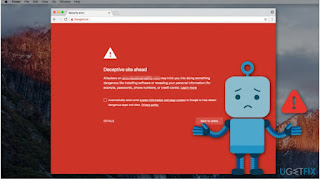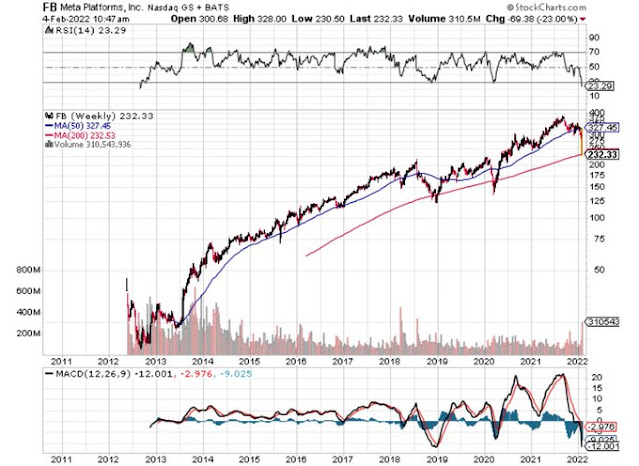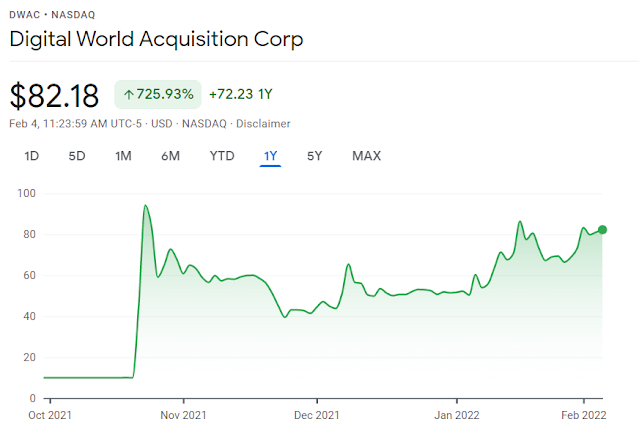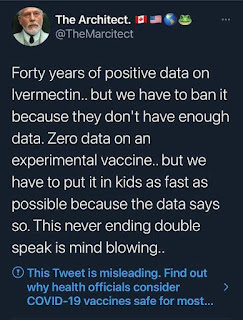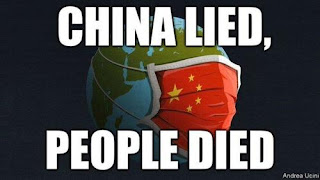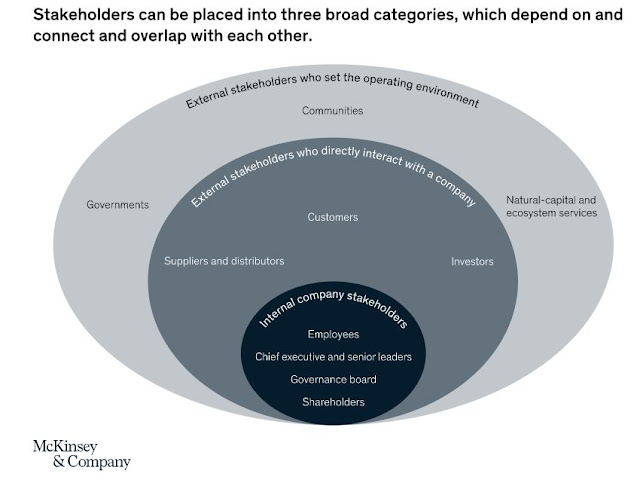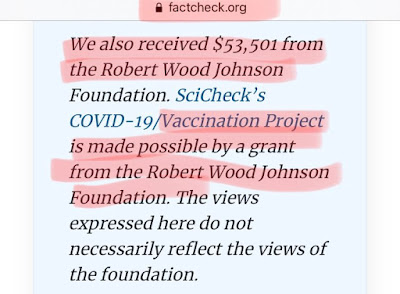When Google is Wrong About Unreliable and Harmful Content
Millions of People Are Leaving Facebook For Alternatives
Meta CEO Mark Zuckerberg saw $29 billion wiped from his net worth when his company’s share price collapsed following its latest quarterly report.
DWAC is about to take a large share of these Facebook users leaving.
What is DWAC? A company that is fighting the fake news and social media censorship is launching a new social media network called Truthsocial.com
Shares of Meta dropped more than 25% in after-hours trading after the company announced lower-than-expected revenue figures, as well as a decline in Facebook users for the first time in its 18-year history.
The number of daily active Facebook users fell by 1 million to 1.929 billion, with the company blaming competition from rivals like TikTok and YouTube.
The poor performance saw the company’s stock market value fall by roughly $200 billion, leading to a drop in Zuckerberg’s fortune, which is mostly tied up in Meta stock. Zuckerberg is ranked as the world’s seventh richest person, according to the Bloomberg Billionaires Index, with his net worth before the collapse estimated at $121 billion.
"Fact Checking" Facebook Sued by John Stossel for Lies
John Stossel is going to have a field day on his social media with this one.
Thank God For the Twitter Fact Checkers
10 Examples of How China's Corruption & Government Killed People
A plethora of politicians and government officials across the globe screwed up in their handling of the COVID-19 Pandemic. The Chinese government, however, was acutely damaging with its ineptitude, because it, more than any other entity, had a chance to limit the spread of the SARS-CoV-2 coronavirus when it first emerged in late 2019. Instead of trying to contain the virus with the help of the international community, however, the Chinese government lied, misled, and stalled. All of humanity has experienced the disastrous result of this negligence.
In his new book, Uncontrolled Spread, physician, senior fellow at the American Enterprise Institute, and former FDA commissioner Scott Gottlieb focused his considerable expertise on pointing out the ways in which the world's response to COVID-19 fell short, and how we can better prepare for the next inevitable pandemic. Early on in the book, he chronicled numerous examples of the Chinese government's inept, corrupt handling of what was then an emerging outbreak.
Here are ten of them:
1. Silencing Genetic Sequencing.
In late December 2019, doctors around Wuhan started noticing people coming in with a strange pneumonia, and began sending patient samples to genomics companies for sequencing. The reports they received back were disturbing – it was a never-before-seen, SARS-like coronavirus. By January 1, provincial health officials instructed these companies to stop testing samples from the Wuhan outbreak and to destroy their remaining specimens. Two days later, China's top health authority ordered genomics labs not to publish any data related to the novel coronavirus.
2. Censoring Doctors.
Early on in the pandemic, Wuhan's local doctors quickly realized that a novel virus was spreading, and took to social media platforms like WeChat and Weibo to share information with each other. They were soon censored by the Chinese government, and posts related to what was then dubbed "Wuhan SARS' were suppressed. Many doctors were detained, interrogated, and threatened with prosecution. "Chinese scientists and physicians took risks, and their efforts saved lives," Gottlieb wrote.
3. Deploying Social Media Bots.
According to ProPublica, more than ten thousand Chinese government-linked accounts on Twitter were used to cast doubt on early reports related to the outbreak in Wuhan.
4. Censoring Social Media.
Citizen Lab documented thousands of keywords related to COVID that were suppressed by the Chinese government on platforms YY and WeChat. Many deleted posts criticized the government for their handling of the outbreak.
5. Not Reporting the Outbreak to the WHO as Required.
As a signatory to major public health treaties, the Chinese government was required to notify the world community of any unusual, novel pathogen within its borders that could spread internationally, typically within 72 hours of detection. The novel coronavirus clearly met this description, yet Chinese officials withheld information about the virus for weeks.
6. Refusing to Share the Coronavirus' Genetic Sequence.
When the genetic sequence of the coronavirus was first shared widely in early January, it was a heroic, rogue Chinese researcher, not the government, who did so. Dr. Zhang Yongzhen was directed not to release the information, but frustrated with what he perceived as irresponsibility by government officials, he defied their order. Within hours, Zhang's lab was shut down by the Shanghai Municipal Health Commission for "rectification".
7. Not Sharing Virus Samples.
Very early on, global researchers were clamoring for Chinese officials to share samples of the novel coronavirus so they could evaluate it and begin developing diagnostic tests, vaccines, and therapeutics. Government officials never did. "Access to those samples at the outset could have helped the world prepare," Gottlieb wrote. "And without the source strains, it would be impossible to determine with any certainty the virus's origin."
8. Attempting to Avoid Travel Restrictions.
In early February, as it started to become clear that China was losing control of the outbreak, the government was still privately clashing with the WHO to block the declaration of a Public Health Emergency of International Concern (PHEIC). Government officials wanted to avoid burdensome travel restrictions which the PHEIC would likely lead to.
9. Misleading the World Health Organization.
In the early days of the pandemic, the WHO publicly stated that it was in constant contact with Chinese government officials. This was true, but the dialogue was essentially useless. "The WHO would submit long lists of questions to Chinese officials, related to the scope and severity of the epidemic. In return, the Chinese government would provide achingly incomplete replies," Gottlieb wrote. Little of value was relayed.
10. Refusing to Allow CDC Scientists Into Wuhan.
Roughly a dozen CDC staff are permanently stationed in Beijing. On January 1, 2020, CDC Director Robert Redfield emailed Dr. George Fu Gao, the director of China's CDC, requesting that these U.S. researchers be granted access to the outbreak hot zone to assist in identification of the novel pathogen. Gao refused, and would do so again when Redfield pressed the matter. At the time, Chinese officials were still saying publicly there was no evidence of person-to-person spread. Redfield believes that U.S. scientists would have quickly discovered that the coronavirus was spreading human-to-human, and doing so asymptomatically.
Why Social Media SHOULD NOT Censor Views
YouTube Has Censored 1 Million Videos For Having Opposing Views
YouTube has removed 1 million videos for dangerous COVID-19 misinformation (aka opposing views) since February 2020, according to YouTube’s Chief Product Officer Neal Mahon.
Mahon shared the statistic in a blog post outlining how the company approaches misinformation on its platform. “Misinformation has moved from the marginal to the mainstream,” he wrote. “No longer contained to the sealed-off worlds of Holocaust deniers or 9-11 truthers, it now stretches into every facet of society, sometimes tearing through communities with blistering speed.”
At the same time, the Youtube executive argued that “bad content” accounts for only a small percentage of YouTube content overall. “Bad content represents only a tiny percentage of the billions of videos on YouTube (about .16-.18% of total views turn out to be content that violates our policies),” Mahon wrote. He added that YouTube removes almost 10 million videos each quarter, “the majority of which don’t even reach 10 views.”
Facebook recently made a similar argument about content on its platform. The social network published a report last week that claimed that the most popular posts are memes and other non-political content. And, faced with criticism over its handling of COVID-19 and vaccine misinformation, the company has argued that vaccine misinformation isn’t representative of the kind of content most users see.
Both Facebook and YouTube have come under particular scrutiny for their policies around health misinformation during the pandemic. Both platforms have well over a billion users, which means that even a small fraction of content can have a far-reaching impact. And both platforms have so far declined to disclose details about how vaccine and health misinformation spreads or how many users are encountering it. Mahon also said that removing misinformation is only one aspect of the company’s approach. YouTube is also working on “ratcheting up information from trusted sources and reducing the spread of videos with harmful misinformation.”
Here are some YouTube video alternatives people are moving to.
Rumble, DailyMotion, BitChute, DTube, PeerTube,Vimeo
What Is Stakeholder Capitalism + COVAX + Big Tech + WHO + UN
Facebook Censors Any Post or Comment That Shows Vaccine Hesitancy
How The Government Makes Twitter Censor Free Speech
#1 - Cybersecurity and Infrastructure Security Agency CISA - We lead the Nation’s efforts to understand and manage risk to our critical infrastructure. CISA is the Nation’s risk advisor, working with partners to defend against today’s threats and collaborating to build more secure and resilient infrastructure for the future. @CISAgov
#2 - IT-ISAC IT Information Sharing & Analysis Center is a non-profit corporation formed by IT companies as a specialized forum for managing risks to their corporations and the IT infrastructure. @ITISAC
Facebook's COVID Vaccine FactCheck.org Funded By J&J
NOTHING TO SEE HERE...
— Thomas Massie (@RepThomasMassie) April 24, 2021
Former director of CDC is now CEO of the foundation that funds FACTCHECK. org’s vaccine fact checking program. Roughly 15% of said foundation’s assets are J&J stock.
Bless your heart if you think factcheck .org is an unbiased source of vaccine information pic.twitter.com/Ijq3sojHmV
Why Censorship Reveals Weakness On The Part of the Tyrant
President Joe Biden wants to suppress speech that discourages Americans from being vaccinated against COVID-19. Because the First Amendment doesn’t allow him to do that, he is asking Facebook and other social-media giants to do it for him.
Vaccine skepticism has existed since the advent of the technology itself. However, the mass uptake of social media is blamed for the significant traction recently gained by the ‘anti-vax’ movement. A recent report found that 400 anti-vax social media accounts contain 58 million followers based primarily in the US, UK, Canada and Australia.
Government-based censorship laws & big tech censorship policies should not be implemented for three main reasons.
#1 - Many people have legitimate concerns around the safety and efficacy of COVID-19 vaccines due to factors including the speed of their development, the underrepresentation of ethnic minority groups in clinical trials and the unknown longevity of their immunological effects. The public must feel freely able to voice these concerns, raise challenging questions and expect transparent replies from trusted institutions. An unintended effect of shutting down anti-vax groups may be to silence those with legitimate questions for fear of shame or ridicule and lead them to harbor greater suspicion of public health authorities and sympathize with anti-vax rhetoric.
#2 - Emergency laws would enforce censorship and de-platforming and threaten the democratic cornerstone of freedom of speech. All ideas – even the bad ones – must be allowed a public airing, and their qualities debated in the marketplace of ideas. It is through this process that institutions foster influence, respect, and public trust, by presenting empirical evidence, reasoned arguments, and a scientific method based on critical thinking. Conversely, widespread de-platforming of anti-vax campaigners is unlikely to dissuade those sympathetic to these messages but rather reinforce their strongly held beliefs about vaccine conspiracies while deepening their mistrust of public health authorities. In addition, removing the social media stages of anti-vax campaigners is likely to drive them underground to adopt alternative stages that are more difficult to identify, monitor, and respond to with public health messaging. The lack of evidence to support censorship as a reliable means of producing desirable health behavior change should deter against the deployment of this strategy.
#3 - The features of an ‘anti-vax campaign’ are themselves undetermined and, depending on the breadth of the definition imposed, may include both the mere voicing of concern for vaccine safety and the intentional distribution of dangerous falsities. Governments will be without the substantial resources required to identify all online anti-vax campaigns and thus will be forced to hand over decision-making powers to social media platforms themselves. This is unlikely to be an optimal strategy for the delivery of public health messaging and risks triggering dangerous normative shifts in the ability of social media platforms to control what the public is and is not able to see.
In any event, all Americans should be alarmed that these giant firms are acting as judge and jury on enormously important issues, like our health or our elections. They must not be allowed to control our information, nor our country. Today, they are doing both.
Here are 4 legitimate health issues that are being censored by big tech and not be covered by the mainstream media:
#1 - Bell’s Palsy Linked To Covid Vaccines?
#2 - COVID-19 Vaccines Enlarged Lymph Nodes Suggest You Already Had The Virus
Facebook, Twitter, Google CEOs Full Censorship Senate Testimony
What @jack told the Senate, under oath, is false. I just tried to tweet the @nypost story alleging Biden’s CCP corruption.
— Ted Cruz (@tedcruz) October 28, 2020
Still blocked.
18 USC 1621 makes it a felony to lie under oath to the Senate. https://t.co/BDHRB8CEzy
DOJ’s Antitrust Case vs Google is Biggest in 20 Years
It is claimed that U.S. antitrust enforcers are crafting a complaint against Google (and its parent company, Alphabet). This week, the Justice Department and a broad group of state attorneys general are meeting and could file suit very soon. While it would allegedly concentrate on the dominance of Google in online advertisement and search, the lawsuit may cover many other aspects of the actions of Google, including its dominance in mobile operating systems and web browsers. After the DOJ's 1998 suit against Microsoft, this suit has the potential to be the most important antitrust case against a technology firm in over 20 years.
In other words, almost all Internet users have a stake in the results of this case, all users of Google Apps, and anyone who watches Google-brokered ads. That's why it has to be performed correctly. It should cover more than just advertisement markets and also concentrate on the consumer strength of Google's search, browser, and smartphone OS. And the antitrust authorities should seek intelligent solutions that go beyond money harm, including breakups and interoperability with competing goods, all while being vigilant in protecting the interests of free expression and privacy of consumers that will eventually be caught up in the mix. Like many, we worry that it might not go well if everything is hurried, so we advise the enforcers to take the time they need to do it right while understanding that there is continual harm.
The Significance of a “Big Case” Antitrust
U.S. government antitrust cases have an important place in the history of innovation, and there is a fair argument to be made that they provided breathing space for innovation even though they did not conclude with a court order to break up a company. The DOJ's case against IBM started in 1969, went to trial in 1975, and was withdrawn in 1982, for "monopolizing or threatening to monopolize the general-purpose market for electronic digital computer systems." While the case did not end with a court-ordered remedy, as it had squashed other rivals for decades, a decade-plus of a public investigation into IBM's business practices arguably stopped the company from squashing nascent rivals like Microsoft. That outcome probably helped start the 1980s personal computer revolution, fuelled by various companies' ideas beyond "Big Blue."
The government's suit against AT&T, which had for much of the twentieth century maintained a legally recognized monopoly on telephone service in the U.S., almost ended the same way as the IBM suit. US v. AT&T was filed in 1974 and by 1982 it had not reached a verdict. "But years of scrutiny, coupled with the emergence of potential rivals who were itching to enter telecommunications service and related markets, led the leadership of AT&T to consent to a split, allowing the" Baby Bells "and technology-focused spinoffs to innovate in data communications and Internet growth in ways that" Ma Bell "could not. With a monolithic AT&T still controlling who could link to telephone networks and what devices they could use, it is difficult to foresee the Internet entering mainstream use in the 1990s. Even though the AT&T heirs finally re-assembled themselves, we still have the creativity unleashed by the split.
Also, a boon to creativity was the 1998 lawsuit against Microsoft over its exclusion of rival Web browser applications from PCs. At the time, Microsoft's AT&T-style merger, perhaps breaking its operating system and software application divisions into different businesses, was a distinct possibility. The trial court actually ordered exactly that. D.C. On appeal, Instead, Circuit opposed a split and directed Microsoft to comply with existing restrictions on its conduct against rival software vendors and PC producers. Again, this appeared to be anything less than a shining accomplishment. But Microsoft shelved plans to smash a little-known search firm called Google in the face of ongoing surveillance of its actions against competitors.
Google grew into so many Internet-related markets two decades later that its place in many of them remains unassailable. Google has been able to buy out or push out almost any company that dares to compete in a number of markets with it. Once again, the engine of disruptive innovation has broken down, and a brave, thoughtful federal and state enforcers' antitrust challenge could be just the thing to help restart it.
Look at the entire Alphabet, not just advertisements
Look at the whole alphabet, not just ads. News reports indicate that Google's litigation will concentrate on the domination of web advertising by the corporation, which is alleged to depress publishers' ad revenues. The suit may also discuss the behavior of Google against rivals in search markets, such as travel and search for goods. In order to see how it contributed to the acquisition of monopoly control in different markets, it should also look at Google's history of mergers and acquisitions, such as the 2007 purchase of advertising company DoubleClick.
Antitrust enforcers will go high on the reach of the complaint. Consumers will not benefit much from a suit that questions Google's actions in the advertisement markets alone. Although the vast collection of Google data on the browsing habits and preferences of users, extracted from its ad networks, causes great harm to customers, it is not yet clear if hundreds of smaller rivals in the ad-tech market, some of which are extremely shady, would be better user privacy stewards. The response here includes both antitrust and much-needed new regulations on privacy. That's going to assist customers around the board.
Google's leveraging of its current market dominance in search, Web browsing (Chrome), and mobile operating systems (Android) should also be questioned by the DOJ and states to keep out competition. The lawsuit should also question whether the collection and control of user data by Google through so many applications and computers, plus data from millions of websites linked to Google's advertisement networks, gives it an advantage that causes anti-trust scrutiny in other markets. These are, in part, novel and challenging antitrust law arguments. Yet enforcers are expected to target hard. Success in keeping Google responsible for its use of monopoly power can help the courts and probably Congress adjust antitrust law for the digital era, even if it does not succeed entirely. It can also help create a bulwark against the Internet's further centralization. And as history indicates, even a suit that eventually does not lead to a split will help make room for creativity outside the walls of today's tech giant from different outlets.
Have a large remedies toolbox: interoperability, innovation follow-on, laws of conduct, and breakups
By now, it is clear that antitrust law enforcers ought to seek solutions beyond money damages. Without altering their actions drastically, Google and Alphabet are big enough to treat almost every fine as a cost of doing business. As part of the litigation, a court-ordered breakup of Alphabet could also be seriously considered, perhaps an order to separate parts of Google's advertising company or to unravel Google's most controversial acquisitions.
In the government's quiver of solutions, however, breakups should not be the only bolt. Asking Google to allow its rivals to create interoperable goods would strike at the root of Google's monopoly issue and could be an easier lift. As we've seen across several examples, building products that can link to current, dominant products, without permission from the incumbent vendor, can be a powerful antimonopoly tool. It can help bring users back into power.
That may mean ordering Google not to interfere with products that block Google-distributed advertising and monitoring in Google's case. Allowing ad- and tracker-blocking technology to thrive will allow consumers to shape the ad-tech industry by supporting businesses that obtain less user information and are more accountable for the information they have. It could also promote innovation in that market (note: one of those innovations is the Privacy Badger of the EFF, but this could benefit several services). Google will have to fight for users' views and clicks in that case by protecting their privacy.
Interoperability requirements implemented as an antitrust remedy or as part of a settlement mitigate many of the concerns that come with more generalized mandates for technology because orders can be crafted to accommodate the technologies and procedures of a particular organization. To ensure enforcement, it may require constant monitoring and help prevent security concerns or other problems that may occur from a one-size-fits-all approach.
A perfect chance to start solving the issues of the monopoly control of Big Tech is the pending litigation against Google. If enforcers act boldly, they will set new precedents for antitrust that will stimulate competition across high-tech markets. As a spur to progress and a monopoly solution, they should also use this opportunity to advance interoperability.
Who are Google's Lawyers?
Google has had a handful of familiar outside lawyers since the companies have dealt with several antitrust court appearances over the past few years.
In a pending private antitrust lawsuit accusing the search giant of monopolizing the online search advertising market, Google has turned to Wilson Sonsini Goodrich & Rosati. When the department questioned the company's search activities, Wilson Sonsini also helped Google fight off the FTC back in 2011. Without penalizing Google, the FTC closed the case in 2013.
Google is also a client of Paul Weiss, who, during the DOJ's antitrust trial, represented Microsoft for Bill Gates' empire.
For most foreign investigations, including the EU's nearly $ 3 billion antitrust fine accusing the corporation of rigging its search results to benefit its own goods, Google has relied on Cleary Gottlieb Steen & Hamilton LLP. In his almost 13-year antitrust case brought by the DOJ, Cleary also represented IBM Corp. In 1982, the government finally dismissed the lawsuit.
Twitter CEO Subpoena Over Blocking Content
The Senate Judiciary Committee will vote to subpoena Twitter CEO Jack Dorsey next week to testify on allegations the company is stifling conservative viewpoints. Sen. Ted Cruz (R-TX) is leading the fight. He says Twitter blocked him from sharing a New York Post article about Hunter Biden.
The article alleged Hunter Biden introduced his dad, Democratic Presidential nominee Joe Biden, to Ukrainian officials. But Cruz says no one could share it on social media. “Suddenly Jack Dorsey and a handful of Silicon Valley billionaires are deciding that no criticism, no allegations, no evidence of corruption concerning Joe Biden are permissible,” Cruz said. “That is blatant election interference.”
“Facebook and Twitter have policies to not spread things that are utterly unreliable,” Coons said.
Jack Dorsey CEO announced Twitter changed its policy Friday morning said in a tweet, “Straight blocking of URLs was wrong.” This was likely pressure for lawsuits threatened.
White House Chief Of Staff Warns Of Potential Lawsuit Against Tech Giants. White House chief of staff Mark Meadows on Monday suggested that the Trump administration would bring a lawsuit against the social media companies that have recently restricted and blocked news reports about Democratic presidential nominee Joe Biden and his son Hunter.
White House chief of staff Mark Meadows on Monday suggested that the Trump administration would bring a lawsuit against the social media companies that have recently restricted and blocked news reports about Democratic presidential nominee Joe Biden and his son Hunter.
In an interview on “Fox & Friends,” Meadows said that the online platforms try to censor conservatives and suggested that if the story about Joe and Hunter Biden was about President Donald Trump and his family, tech companies would have not blocked the story.
The Chief of Staff’s comments come in the wake of a report by the New York Post alleging to have obtained emails from a laptop belonging to Hunter Biden. Many Democrats have claimed the story is an effort to discredit Joe Biden and an attempt by Russia to help elect Trump. So far, neither of the Bidens have denied the authenticity of the emails.
The threat of a lawsuit was also prompted by the actions Twitter took to lock Trump’s reelection campaign account last Thursday for trying to share the New York Post story.
Meadows said he has not received any intelligence suggesting that the Russians were involved in the emails being extracted from Hunter Biden’s laptop as Rep. Adam Schiff (D-Calif.) has alleged.
NEW — U.S. Senator Josh Hawley has formally requested @Twitter CEO Jack Dorsey and @Facebook CEO Mark Zuckerberg to appear before the Senate Judiciary Subcommittee on Crime and Terrorism in a coming hearing titled "Digital Platforms and Election Interference.” pic.twitter.com/VlXBo17bX0
— Senator Hawley Press Office (@SenHawleyPress) October 15, 2020
Facebook Bans Ads Questioning Safety Of COVID-19 Vaccines
Clearly, Mark Zuckerberg had enough of being dragged in front of Congress and hectored by a gang of senior citizens, and listening to the ACLU leader slam his business as a vessel for violent hate speech. Since Facebook has done a full 180 on its stance on speech, especially sensitive political speech, over the past few months. Apparently, Zuckerberg was shaken by his non-interventionist stance by declaring that during the last week of the campaign, FB would not allow new political advertising, and only yesterday by declaring that Facebook would clamp down on its site on holocaust deniers.
Salvos against QAnon and electoral disinformation have also been launched by the organization, thus taking an active approach to political advertisements and political material in general.
And as global authorities try to persuade the public that, despite the expedited approval process, a potential COVID-19 vaccine would be safe to take, Facebook has agreed to give them a hand by deleting all material that allows users to refuse to take a vaccine. In a blog post published Tuesday, it set out the latest global agenda.
Facebook would draw the line and enable users who argue against "mandatory vaccination," a valid political stance the company said was (not a claim made in "poor faith" as some on the left insist), and post as usual. They quoted an instance of a Virginia state lawmaker who posted "STOP FORCED CORONAVIRUS VACCINATIONS."
Although the above advertising will be permissible under the new legislation, it will forbid advertisements that directly prevent people from taking vaccines by presenting the vaccines as ineffective or dangerous.
"If a vaccine is specifically prevented by an ad that advocates for/against legislation or government policy, it will be refused," a CNBC spokesperson wrote. "That includes presenting vaccines as useless, ineffective, dangerous or unhealthy, describing vaccines for diseases as harmless, or as harmful or deadly ingredients in vaccines."
Facebook also plans to push recommendations on how and when to get the flu vaccine for all individuals.
There is no coincidence with the timing. Analysts at Goldman Sachs wrote in a recent research note that confidence in the vaccine may be a significant obstacle to its eventual eradication. "We agree that the greatest obstacle will be to persuade the broad population to take the vaccine to effectively minimize the burden of disease and virus circulation to very low levels. Our basic case assumes such large acceptance, but this will probably entail a safe and very efficient vaccine, faith in the mechanism of approval and rollout, no out-of-pocket costs, and efficient public and community campaigns."
And news about JNJ 's recent halt was definitely not encouraging, especially because the public was still not aware of what was going on in the US with the halted AstraZeneca-Oxford trials.
As we have noted, the decision of Facebook comes as Bill Gates challenges Trump's FDA's authority, and Kamala Harris tells the American people that she "will not take" a vaccine approved by Trump.
Throughout Africa, a host of other terribly paralyzing and debilitating diseases have been reported in vaccines developed by Gates but never tested on humans until used in Africa.
This is India's medical study addressing the paralysis arising from the vaccinations of Gates, affecting 450,000 children and babies for life. This is why Gates was sued for his Crimes Against Humanity by India. The last page summarizes the damage sustained by 1/2 million young Indians. The remainder of the study is a very technical, accurate, and horrible medical report.
Because of his Crimes Against Humanity carried out with his vaccines around the world, India, Russia and China have barred Gates from entering or using his vaccines for life.
Popular Posts (All Time)
-
Table of Contents Introduction: Stress, Smoking, and Health The Normotim Effect: A New Hope in Stress Management Lithium Ascorbate:...
-
The coronavirus disease (COVID-19) pandemic has been linked to mental health issues related to disease-induced morbidity and mortality and p...
-
A group of virologists in February 2020 published a letter in The Lancet stating they “overwhelmingly conclude that this coronavirus origina...
-
Former Hunter Biden business partner Tony Bobulinski has confirmed that an email published in the New York Post's bombshell exposé is i...
-
SAMPLE LETTER BELOW 🚨🚨🚨 The secret is NOT to refuse the Jabb.... From a lawyer: If you are being forced to Vax in order to keep your job,...
-
The time is now. As most readers of this substack are now well aware, this is not just about COVID. The Constitution hangs in the balance. P...
-
Comment to ACIP meeting of August 30, 2021 submitted by Steve Kirsch - Executive Director of the COVID-19 Early Treatment Fund stk@treatearl...
-
Klaus Schwab's World Economic Forum Government & WHO Lies Tucker & Malone Discuss The World Economic Forum & It's Young ...
-
2 Sources for this story below . . . Justin Bieber reveals he has Ramsay Hunt syndrome Twitter suspended the VaccineTruth2 account Want to ...
-
Crimes Against Humanity - The PCR Test Fraud and COVID-19 will be the Case of the Century Reiner Fuellmich - Update on Court Case & P...

